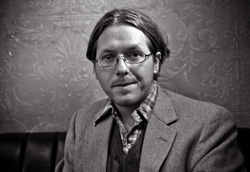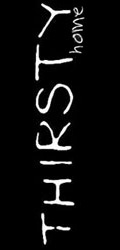

By Jay Fox
Brooklyn, NY, USA

Jay Fox
Kafka's The Trial is certainly a strange book, especially if you end up reading the majority of it while standing in various lines in various courts throughout New York County. The novel focuses on the trial of Josef K., the protagonist, who is arrested at the beginning of the book for no stated reason. Furthermore, he is never sent to a jail cell. He is simply told that he has been arrested, that a trial will commence and that he is free to go about his daily routine.
As it is a Kafka novel, such a bizarre opening is followed by far more bizarre incidents, many of them revolving around K.'s attempts to understand the nature of the crime for which he as been arrested. Though he may believe that he is innocent, he never finds out what exactly he has been accused of, and his attempts to even understand the nature of the Law, which is distinct from either civil or criminal law, prove impossible because the clerks and lawyers with whom he speaks while wondering around attics (yes, anything associated with the court to which this Law pertains tends to be situated in the attic or on the top floor of a residential building) can only offer brief glimpses into how this strange legal system operates. At best their depictions are vacuous. At worst, they are completely contradictory.
The Trial was written in 1914, but was not published until 1925, a year after Kafka's death. Though some may want to liken this book to numerous anti-totalitarian novels from the twentieth century, such as Koestler's Darkness at Noon, Kafka's novel, to me, is more akin to Camus' The Myth of Sisyphus, which is not a novel, but a book of essays that deal with the absurd.

Franz Kafka
While Kafka's prose is laconic and the way in which he writes dialogue is usually limited to a kind of awkward and brief exchange between characters, the penultimate chapter of the novel is home to a rather large monologue given by a priest who also identifies himself as the prison chaplain. Within this monologue is what seems to me to be the primary metaphor of The Trial. It also echoes what Camus said about Shestov's concept of God: "His greatness is his incoherence."
The focus of this monologue is a retelling of a parable from the text of the Law, which concerns a man, a doorkeeper and the door over which the keeper has been told to watch. The man is forbidden entry and spends his entire life waiting to be allowed admittance. Finally, as he is about to die, he finally asks the keeper why no one else has sought to enter this door. The doorkeeper responds, "No one else could gain admittance here, because this entrance was meant solely for you. I'm going to go and shut it now." While this, in a way, really sums up The Trial in many regards, something that the priest says a little later in the chapter really struck me: "The text [of the Law] is immutable, and the opinions are often only an expression of despair over it." If the "text" is the world around us, and the "opinions" are the ways in which we attempt to understand and deal it (via religion, law, politics, philosophy, etc.), then Camus was certainly right when he wrote, in his essay on the works of Kafka, that "In a world where everything is given and nothing is explained, the fecundity of value or of a metaphysic is a notion devoid of meaning."
Link:
Jay Fox's Profile at Stay Thirsty Publishing





